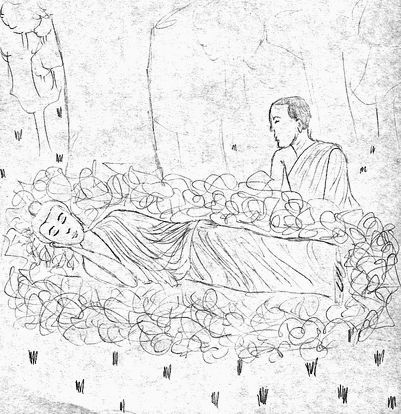previous contents next
Chapter 28: Returning North To Die
For the 45 years of his teaching the Buddha never ceased in his work, preaching tirelessly to all kinds of people. He never became impatient with a question, or found one that he could not answer. By the end of this 45 years of ministry, he was 80 years old, and he knew that the time was drawing near when he would attain the state of nirvana. Before that happened, he wanted to return to the Himalayas where he had been a child, so he took Ēnán and a few others and left the town of Wángshè.
He journeyed north through the land of Bō-zhàlí 波咤厘 and through the town of Píshè-lí 毘舍离. There a singing girl named Ān-móluó 庵摩罗 offered him a grove to establish a hermitage, which came to be known as Ān-móluó Grove (Ān-móluó shùyuán 庵摩罗术园).
When they got to the village of Bamboo Grove (Zhúlín 竹林), the Buddha told his bǐqiū to spread out and stay wherever they were offered space. He and Ēnán stayed in the village. While they were there, the Buddha took sick. When he recovered Ēnán admitted that he had been worried that the Buddha might die, when there was more to teach.
"There is no more to teach," said the Buddha. "I have taught you everything about how to reach nirvana and left nothing out. There are no secret teachings. You must not depend on me. You must depend on yourselves. The Law (fǎ) is the heart of everything. There is nothing else."
The following morning, the Buddha felt better, and went out to beg as usual, then went to meditate in the shade of a tree near the Bōpó pagoda (Bōpó Tǎ 波婆塔). As he meditated, he experienced a premonition that in three months he would attain nirvana. When Ēnán came to help him back that evening, he told him, "Ēnán, the Lord of the World (shìzūn 世尊) will attain nirvana on the 15th day of the 6th month. There are still three months."
Ēnán was not happy at the prospect of the Buddha leaving him, but the Buddha assured him that death was inevitable, and there was no point in worrying about it. And he told Ēnán to assemble all the bǐqiū in the town of Píshèlí at the Great Wood Hermitage (Dàlín Jīngshè 大林精舍). There the Buddha preached to them, telling them of his attaining nirvana. He reminded them that nothing in this world is unchanging, and he reminded them of his teachings on how to avoid the sufferings of the cycle of life and death.
One day the Buddha wanted to see the town of Píshèlí for one final time, and he went in begging with Ēnán.
"This is our last time begging together in Píshèlí, Ēnán," he said. "Let's go and spread the word in the village of Bāzhà 巴咤." And they did. And also in the villages of Hātí 哈提 and Ānbā 安巴 and Rénbù 仁布. They went to the town of Dáhù-qié 达护伽, where they rested near the pagoda that is today called the Ēnántuó pagoda.
Everywhere the Buddha preached to the local people and to his bǐqiū.

The Buddha could go no further and asked Ēnán to prepare him a bed among the trees. Then he lay there resting, as peaceful as ever in the past.
Drawing by Tu Hoang, Thurgood Marshall College (UCSD), Class of 2011, and an Anonymous Fellow Student, Eleanor Roosevelt College (UCSD), Class of 2009, by permission
Finally he led his followers to the town of Bōpó, where he had had the premonition about attaining nirvana. There they rested in a mango grove which belonged to a goldsmith's son named Chúntuó 淳陀. The Buddha preached to Chúntuó and his family. The next day, at their invitation, he returned. But among the foods they offered to him was an herb tea made from something called "sandlewood ear" (zhāntán'ěr 旃檀耳), and shortly after he ate it his old illness attacked once again.
Despite his illness, the Buddha continued his wandering. This time he headed towards the town of Jūshī-nuó 拘尸那, where he would die.
Along the way they met a prince of the Mòluó 末罗 clan named Bōgē-suǒ 钵哥索, which was the clan that ruled the town of Jūshī-nuó. The prince was a student of the Buddha's old teacher Ēluó-lán. When the Buddha told Bōgē-suǒ who he was and what he was doing, Bōgē-suǒ immediately became his follower, and presented him with two bolts of fine golden cloth. The Buddha received one, and asked that the other be given to Ēnán.
When they had rested, they crossed the River Jiāqū-cuǒ 迦屈瑳 and the River Xīlián-chán 熙连禅 and approached the town of Jūshī-nuó. When they reached a grove of suōluó 娑罗 trees outside the gates of Jūshī-nuó, the Buddha could go no further and asked Ēnán to prepare him a bed among the trees. Then he lay there resting, as peaceful as ever in the past.
Ēnán withdrew into the wood and wept as he thought of his master dying and leaving him alone in the world. While Ēnán was grieving, the Buddha opened his eyes and, not seeing him, asked where he had gone. One of the bǐqiū told him about Ēnán crying his heart out in the wood. The Buddha sent for him, and very compassionately consoled him. And he told the bǐqiū that all the buddhas of the past had had illustrious assistants, but none surpassed Ēnán.








